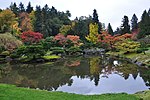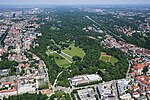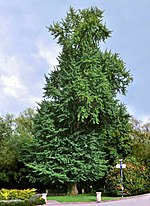Urasenke (裏千家) is one of the main schools of Japanese tea ceremony. Along with Omotesenke and Mushakōjisenke, it is one of the three lines of the Sen family...
27 KB (2,881 words) - 03:30, 20 July 2023
of the Urasenke family. Sen is the family name and Sōshitsu is the hereditary name assumed by the successor upon becoming iemoto of Urasenke. The first...
1 KB (195 words) - 04:08, 20 October 2022
sōshitsu, 19 April 1923) is the 15th-generation Grand Master (iemoto) of Urasenke, which is one of the most widely known schools of Japanese tea, and served...
7 KB (748 words) - 21:09, 15 November 2024
Sōshitsu Sen XVI [ja], the sixteenth hereditary grand master (Iemoto) of the Urasenke Japanese Tea Ceremony School, in December 2002. The couple have two sons...
7 KB (484 words) - 06:53, 2 October 2024
Japanese Way of Tea, that are directly descended from Rikyū: the Omotesenke, Urasenke, and Mushakōjisenke, all three of which are dedicated to passing forward...
18 KB (2,269 words) - 16:10, 13 November 2024
Omotesenke (表千家) is one of the schools of Japanese tea ceremony. Along with Urasenke and Mushakōjisenke, it is one of the three lines of the Sen family descending...
7 KB (609 words) - 21:06, 20 October 2023
sense of wabi. Sen no Rikyū's great-grandchildren founded the Omotesenke, Urasenke, and Mushakōjisenke schools of tea ceremony, and the tea ceremony spread...
63 KB (7,633 words) - 20:56, 1 October 2024
XV, and currently the sixteenth hereditary grand master (iemoto) of the Urasenke Japanese tea ceremony School; and has two sons, Akifumi Kikuchi [ja] and...
31 KB (3,094 words) - 10:47, 18 November 2024
19. The first tea ceremony was conducted on July 4, 1959, by visiting Urasenke grand master Sen Sōshitsu XV. Construction began in late 1959 and used...
10 KB (1,054 words) - 19:07, 26 June 2024
was introduced in 1666 when Maeda Toshitsune invited Senbiki Soshitsu of Urasenke to Kanazawa. Kutani ware (Kutani yaki) is a bright colored glaze like Chinese...
28 KB (1,862 words) - 07:58, 16 November 2024
san-Senke (三千家, "three Sen houses/families"), and consist of the Omotesenke, Urasenke, and Mushakōjisenke schools of tea. Another line, which was located in...
15 KB (1,972 words) - 12:31, 8 October 2024
XV, and currently the sixteenth hereditary grand master (iemoto) of the Urasenke Japanese tea ceremony School; and has two sons, Akifumi Kikuchi [ja] and...
33 KB (3,033 words) - 02:36, 18 November 2024
1969. The teahouse was a gift to Bavaria from Soshitsu Sen, head of the Urasenke tea school in Kyoto, and it was designed by Soshitsu Sen and Mitsuo Nomura...
31 KB (4,042 words) - 09:01, 20 August 2024
懐石: The Development of Formal Tea Cuisine". Chanoyu Quarterly no. 50 (Urasenke Foundation, 1987). Look up 懐石料理 or 会席料理 in Wiktionary, the free dictionary...
16 KB (1,734 words) - 01:55, 16 June 2024
A red lacquered natsume next to a tea bowl (chawan), bamboo tea scoop and whisk of the Urasenke school...
10 KB (1,226 words) - 01:30, 4 August 2024
have been excluded by a physician. The ginkgo leaf is the symbol of the Urasenke school of Japanese tea ceremony. The tree is the official tree of the Japanese...
67 KB (7,142 words) - 12:35, 16 November 2024
Canadian students, who participate in unique inter-cultural programmes. UBC's Urasenke Japanese tea ceremony club uses the residence's tatami room for practice...
133 KB (13,791 words) - 15:05, 4 November 2024
original on 2017-01-16. Retrieved 2017-01-15. "Chado, the Way of Tea". Urasenke Foundation of Seattle. Archived from the original on 2012-07-23. Retrieved...
13 KB (1,505 words) - 19:12, 29 October 2024
at UCLA there was a once-in-a-lifetime opportunity to take a class in Urasenke-style tea ceremony. I was studying Japanese history at the time. I thought...
22 KB (3,179 words) - 01:49, 6 October 2024
(今日庵, Today Hut) built by Sen Sōtan at what later became known as the Urasenke Konnichian estate. The floor space is composed of but one full tatami,...
20 KB (2,439 words) - 20:39, 2 June 2024
hired for the redesign Horitoku, a garden architect from the school of Urasenke. In 1939, the two gardens were bought and combined by Jyunsaku Nakamura...
5 KB (568 words) - 20:51, 19 September 2024
Birnbaum, "A Brief History of Tea in Japan." Chapter One in CHANOYU: The Urasenke Tradition of Tea. Weatherhill, 1988. "A Theory of Culture during the Ōei...
9 KB (894 words) - 18:38, 5 September 2024
women's school, she was acquainted with a sadō instructor from the house of Urasenke. Through their interaction, Yaeko was able to familiarise herself with...
16 KB (1,496 words) - 08:00, 21 October 2024
Mushanokōjisenke, is one of the three schools of Japanese tea ceremony. Along with Urasenke and Omotesenke, the Mushakōjisenke is one of the three lines of the Sen...
3 KB (260 words) - 07:51, 30 October 2023
the hereditary series of Japanese tea masters who have been head of the Urasenke family. Although he was the first person in the Sen family to use the name...
4 KB (509 words) - 13:12, 30 April 2024
title of iemoto is also passed down along with a hereditary name. In the Urasenke tradition of tea ceremony, for example, the iemoto carries the name "Sōshitsu"...
9 KB (998 words) - 23:39, 6 April 2023
is a Canadian tea master, author, martial artist, and professor of the Urasenke tradition. His life is filled with Japanese culture and the pursuit of...
7 KB (683 words) - 03:02, 8 October 2023
university in 1972 by Sen Sōshitsu, the 15th-generation grand tea master of the Urasenke Foundation. In May 1967, the Thai Pavilion, a gift of King Bhumibol Adulyadej...
33 KB (3,756 words) - 16:54, 1 November 2024
Louise. "The Grand Kitano Tea Gathering," Chanoyu Quarterly, no. 31 (Urasenke Foundation, Kyoto, 1982: ISSN 0009-1537), p. 15. Guth, Christine M.E.,...
11 KB (1,722 words) - 05:58, 18 March 2023
in Japan", pp. 21–23. Chapter One in Sōshitsu Sen XV, ed., Chanoyu: The Urasenke Tradition of Tea. Weatherhill, 1988. ISBN 0-8348-0212-0. Japanese Rikyū...
4 KB (566 words) - 09:22, 24 June 2021






















